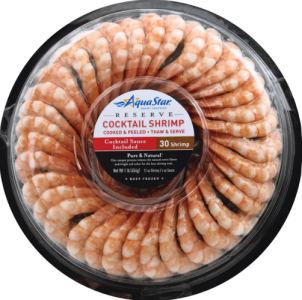Bought shrimp recently? Over 26,000 packages recalled for radioactivity—Walmart’s second shrimp pull this season amid seafood safety concerns
- Replies 0
If you’ve recently picked up a tray of shrimp from the grocery store, it’s time to check your fridge—and fast.
In a recall that sounds more like a plot twist from a sci-fi thriller than a grocery store run, the US Food & Drug Administration (FDA) has announced that over 26,000 packages of frozen shrimp may be contaminated with a radioactive substance. Yes, you read that right: radioactive shrimp.
Before you panic and start picturing glowing seafood, let’s break down what’s really happening and what you should do next to keep your dinner table safe.
This recall is the latest in a string of seafood safety scares, and it’s the second time Walmart has had to pull shrimp from its shelves this season.
The culprit? Imported shrimp from Indonesia, specifically AquaStar (USA) Corp Cocktail Shrimp, which may have been exposed to cesium-137 (Cs-137), a radioactive isotope.
While no shrimp sold in US stores has actually tested positive for Cs-137, the FDA isn’t taking any chances after discovering unsanitary packing conditions that could allow for contamination.

This radioactive element is a byproduct of nuclear fission and can pose serious health risks if ingested, even in small amounts.
Long-term exposure to radioactive materials like Cs-137 can increase your risk of cancer and, in rare cases, cause acute radiation syndrome.
The FDA’s concern is not about immediate illness but about the potential for long-term health effects if contaminated shrimp is consumed over time.
If you shop at Walmart in any of the following states, pay close attention: Alaska, Alabama, Arkansas, Colorado, Georgia, Iowa, Idaho, Illinois, Indiana, Kansas, Kentucky, Louisiana, Michigan, Minnesota, Missouri, Mississippi, Montana, Nebraska, North Dakota, Ohio, Oklahoma, Oregon, South Dakota, Tennessee, Texas, and Washington.
The recalled shrimp was sold in the refrigerated section between July 31 and August 16.
Also read: Double recall alert: FDA flags health risks in popular seafood items
Here’s what you should do:
As consumers, it’s important to stay informed, check recall lists regularly, and never hesitate to ask questions about where your food comes from.
Read next: Are the frozen shrimp in your freezer hiding danger? Shocking FDA warning for Walmart shoppers

Have you ever had to return a recalled product? How do you keep track of food safety news? Do you have tips for fellow readers on staying safe and savvy at the grocery store?
In a recall that sounds more like a plot twist from a sci-fi thriller than a grocery store run, the US Food & Drug Administration (FDA) has announced that over 26,000 packages of frozen shrimp may be contaminated with a radioactive substance. Yes, you read that right: radioactive shrimp.
Before you panic and start picturing glowing seafood, let’s break down what’s really happening and what you should do next to keep your dinner table safe.
This recall is the latest in a string of seafood safety scares, and it’s the second time Walmart has had to pull shrimp from its shelves this season.
The culprit? Imported shrimp from Indonesia, specifically AquaStar (USA) Corp Cocktail Shrimp, which may have been exposed to cesium-137 (Cs-137), a radioactive isotope.
While no shrimp sold in US stores has actually tested positive for Cs-137, the FDA isn’t taking any chances after discovering unsanitary packing conditions that could allow for contamination.

Cesium-137 is not something you want in your seafood or anywhere near your dinner plate. Image source: Aqua Star / FDA
This radioactive element is a byproduct of nuclear fission and can pose serious health risks if ingested, even in small amounts.
Long-term exposure to radioactive materials like Cs-137 can increase your risk of cancer and, in rare cases, cause acute radiation syndrome.
The FDA’s concern is not about immediate illness but about the potential for long-term health effects if contaminated shrimp is consumed over time.
If you shop at Walmart in any of the following states, pay close attention: Alaska, Alabama, Arkansas, Colorado, Georgia, Iowa, Idaho, Illinois, Indiana, Kansas, Kentucky, Louisiana, Michigan, Minnesota, Missouri, Mississippi, Montana, Nebraska, North Dakota, Ohio, Oklahoma, Oregon, South Dakota, Tennessee, Texas, and Washington.
The recalled shrimp was sold in the refrigerated section between July 31 and August 16.
Here’s what to look for:
- Brand: AquaStar (USA) Corp Cocktail Shrimp
- Packaging: Clear plastic trays with red and white labels
- UPC: 19434612191
- Lot Codes: 10662 5106, 10662 5107, 10662 5124, 10662 5125
Also read: Double recall alert: FDA flags health risks in popular seafood items
What should you do if you have the shrimp?
First and foremost: Do not eat it. Even though there have been no reported illnesses and no confirmed cases of radioactive contamination in the US, the risk is simply not worth it.Here’s what you should do:
- Dispose of the shrimp safely or return it to your Walmart store for a full refund.
- Contact AquaStar at 1-800-331-3440 if you have questions or concerns.
- Monitor your health if you think you may have already consumed the recalled shrimp, and consult your doctor if you experience any unusual symptoms.
As consumers, it’s important to stay informed, check recall lists regularly, and never hesitate to ask questions about where your food comes from.
Read next: Are the frozen shrimp in your freezer hiding danger? Shocking FDA warning for Walmart shoppers
Key Takeaways
- More than 26,000 packages of AquaStar cocktail shrimp sold at Walmart in several US states have been recalled due to concerns they may be contaminated with the radioactive isotope cesium-137.
- The affected shrimp was sold in clear plastic trays with red and white labels, bearing UPC 19434612191 and specific lot codes, between July 31 and August 16.
- The US FDA advises customers not to consume the recalled shrimp and to either throw it away or return it to Walmart for a refund, as even small doses of radioactive contamination can increase cancer risk.
- While no illnesses have been reported and no shrimp in US stores has tested positive for radioactive contamination, the recall is a precaution due to unsanitary packing conditions and ongoing FDA investigations.






